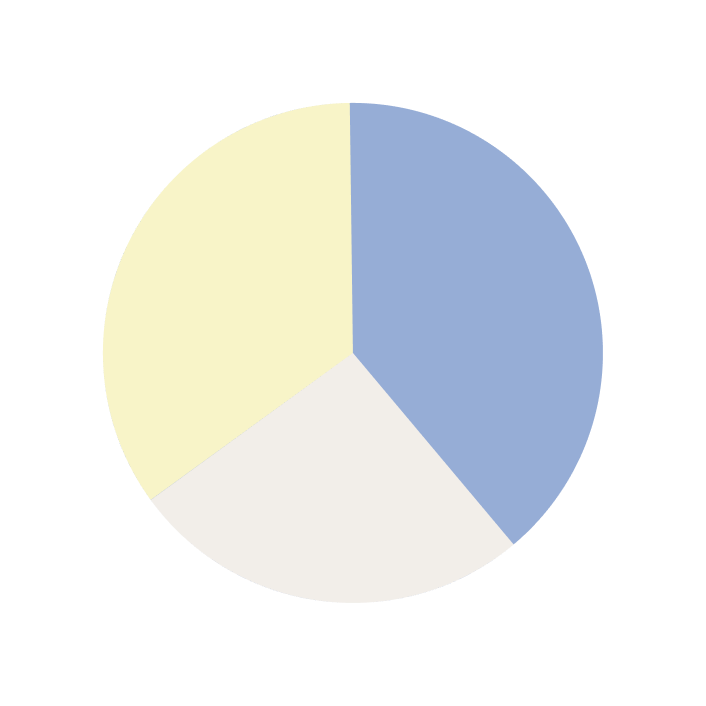UTD Cupboard: Food for the Students
This project tackles food insecurity at UTD by designing a user-friendly mobile app that connects students to affordable food, recipe tools, and campus resources to support their well-being and academic success.
Role: UX Researcher, UX Designer
Duration: 4 months
A look into how students navigate meals on limited time, money, and ingredients.

8 of 23 survey participants identified as students of Naveen Jindal School of Management, 6 identified as Harry W. Bass Jr. School of Arts, Humanities, and Technology, and the remaining 9 identified in other schools within UTDallas.

13 of 23 survey participants are expected to graduate in 2026.
Target Audience
My target audience is UTD undergraduates who live off-campus, manage tight budgets, often work part-time, and face challenges with cooking, meal planning, and maintaining regular eating habits.
Key Challenges
High Prevalence and Impact of Food Insecurity
A significant number of UTD AHT students face food insecurity, with 27% reducing or skipping meals and 21% experiencing hunger due to lack of funds, an issue that negatively affects their academic performance, mental health, and physical well-being.
Low Awareness and Stigma of Available Resources
Despite resources like the Comet Cupboard, only 22.2% of food-insecure students use on-campus food pantries, revealing major barriers in awareness, accessibility, and stigma around seeking support.
Research
Students didn't have the food, time, tools, or knowledge to turn it into meals.
Interviews
The interviews with UTD students were conducted to understand their personal experiences, perceptions, and coping mechanisms related to food insecurity, and to gather insights and suggestions for potential solutions and university support aimed at alleviating student hunger.
- Many students experience financial strain and difficulties with budgeting, leading to food insecurity, especially when managing finances independently or overspending on non-food items, though some benefit from parental support.
- Busy college schedules and limited cooking skills contribute significantly to food insecurity, often causing students to skip meals, prioritize other activities, or rely on expensive takeout and less nutritious options like ramen due to a lack of "cooking literacy".
- Food insecurity impacts students' social lives by limiting their ability to afford dining out with friends, yet discussions about financial strain related to food are common, casual, and sometimes even joked about among peers, fostering understanding.
- Students propose solutions including expanded access and increased visibility for campus resources like "Free Grocery Bingo" and the Comet Cupboard (potentially integrated into a campus app like GET mobile), as well as features for coupon collection, price comparison, community cooking classes, and on-campus grocery stores.
Q: Can you talk about any experiences you've had with food insecurity since starting college?
A: I would say food plays a pretty big part. I mean, I'm eating three times a day, so I have to spend quite a bit of money, especially on groceries and stuff like that. But it does take a good chunk of my paychecks. I try to get food for the week or maybe two weeks, but everything is getting really expensive now, so it's getting more of my money.
Netnography
The netnography analyzed Reddit posts from the UTD subreddit to understand student discussions and concerns related to food and dining, specifically highlighting affordability, convenience, and the need for accessible on-campus resources like dining halls and food pantries.
- Netnography of Reddit posts from the UTD subreddit revealed that affordability and convenience are key concerns for students regarding food and dining.
- Discussions on Reddit highlighted student-shared strategies for finding affordable food options both on and off campus, which reflects the financial challenges many students face.
- Posts frequently inquired about the location and operating hours of dining halls and food pantries, underscoring the demand for readily accessible on-campus resources for students with demanding schedules and limited transportation.
Literary Analysis
The netnography analyzed Reddit posts from the UTD subreddit to understand student discussions and concerns related to food and dining, specifically highlighting affordability, convenience, and the need for accessible on-campus resources like dining halls and food pantries.
- Food insecurity is a significant and widespread issue among U.S. college students, with 19% experiencing it and an additional 25.3% at risk, driven by factors like reduced state funding for higher education, leading to increased tuition, inadequate financial aid, and high living costs.
- Food insecurity profoundly impacts student success, contributing to stress, anxiety, and lower graduation rates, and often forcing students to skip meals or rely on low-cost, less nutritious options like "ramen noodles" due to financial strain and a "lack of cooking literacy".
- Despite campus resources like food pantries, only 22.2% of food-insecure students utilize them, indicating significant barriers such as lack of awareness, accessibility issues, and social stigma, which necessitates broader systemic interventions and improved publicity for existing support programs.
This empathy map focuses on UTD students navigating food insecurity, shedding light on their daily realities: what they see, hear, say, and do. It highlights the emotional burden, social stigma, and financial strain they face, while pointing to motivations for change and opportunities for support.
Ideate
I brainstormed ways to simplify cooking with what's already on hand.
These hand-drawn wireframes visualize the core features of a student-focused pantry and food support app for the UTD Cupboard. Designed to empower students facing food insecurity, the sketches outline key functionalities.
Usability Testing
During paper prototyping sessions, particularly for "Task 1: Find Available Items," users expressed confusion and a strong desire for better organization of available items in the Comet Cupboard. A key note from testing was the need for a "Search feature to find certain items (not just scrolling)" and categories to help users navigate inventory more effectively. This direct feedback highlighted the critical importance of intuitive navigation for essential resources.
Ideas became interfaces with ingredient checklists, smart suggestions, and step-by-step guides.
Features
Enhanced Access to Comet Cupboard and Campus Food Resources
This feature provides a centralized, visible section within the app for Comet Cupboard information, including hours, contact details, and real-time item availability. This is useful because it directly addresses the low awareness and logistical barriers, making it significantly easier for students to find and utilize this crucial resource discreetly.
Linked to Comet Cupboard & User-Selected Ingredients
This feature provides a dynamic recipe section within the app that is seamlessly integrated with the Comet Cupboard's inventory. This allows users to discover simple and beginner-friendly recipes that specifically include items currently available in the pantry, thereby promoting food literacy and encouraging students to obtain and utilize these items.
Peer Support and Recipe Sharing Community
This feature creates a dedicated space for students to connect, share budget-friendly recipes (especially for Comet Cupboard ingredients), and exchange cooking tips. It's useful because it fosters a supportive community, helps reduce the stigma of food insecurity, and provides practical solutions for maximizing limited food resources, reflecting interviewees' suggestions for community cooking classes and "Free Grocery Bingo".
A student-centered mobile app prototype for UTD's Comet Cupboard, designed to streamline food pantry access, showcase inventory, suggest recipes, and foster community through forums and volunteering.
User feedback helped fine-tune a tool made to ease everyday eating.
Conclusion
The UTD Cupboard app aims to be a comprehensive solution for students facing hunger by centralizing resources, promoting financial literacy, and fostering a supportive community. By making essential food assistance more accessible and less stigmatizing, the app endeavors to improve the overall well-being and academic success of UTD students, transforming challenges into opportunities for growth and self-sufficiency.
Insights
Prioritizing Core User Needs for Resource Access
This highlights that a fundamental human-centered design principle is to first identify and directly address the most pressing, logistical barriers users face, such as low awareness and accessibility of existing resources like the Comet Cupboard.
Designing for Practicality and Immediate Problem-Solving
This demonstrates the importance of designing features that enable users to solve immediate, real-world problems with the resources they possess.
The Critical Role of Usability and Intuitive Navigation
This underlines that even well-intentioned features must be highly usable and intuitively navigable for users to adopt and benefit from them, emphasizing the iterative process of refining the user interface based on direct feedback.
Addressing Emotional and Social Dimensions of User Experience
This highlights that human-centered design must extend beyond functional utility to consider the emotional and social well-being of its users.
Integrating Life Skills Education within Functionality
This insight shows that effective UX design can incorporate educational components to empower users with valuable life skills, thereby indirectly mitigating the core problem of food insecurity.
Iterative Design Driven by Comprehensive User Feedback
The entire project, from initial secondary research and interviews to surveys and paper prototyping, was an iterative cycle of gathering and applying user feedback, demostrating continuous user input is essential for refining and validating design choices to truly meet user needs.